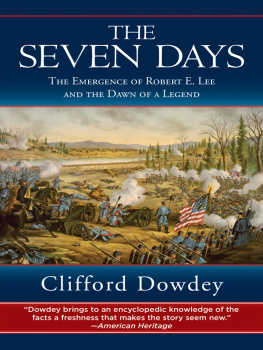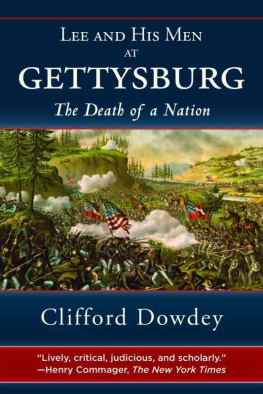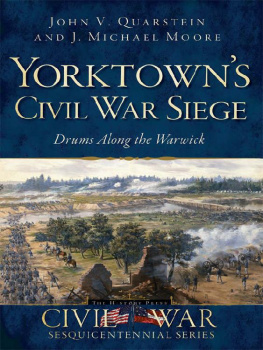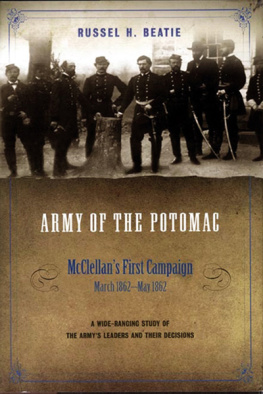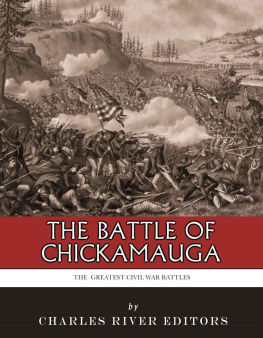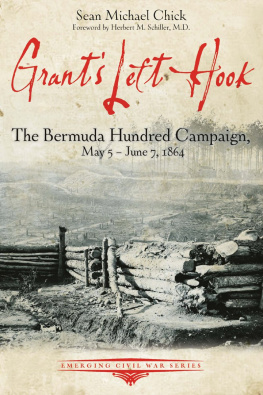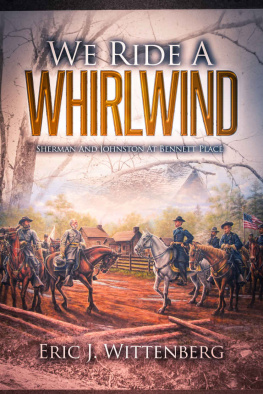The Seven Days
The Seven Days
The Emergence of Robert E. Lee and the Dawn of a Legend
by CLIFFORD DOWDEY

Copyright 1964, 2012 by Clifford Dowdey Copyright renewed 1992 by Carolyn Dunaway
All Rights Reserved. No part of this book may be reproduced in any manner without the express written consent of the publisher, except in the case of brief excerpts in critical reviews or articles. All inquiries should be addressed to Skyhorse Publishing, 307 West 36th Street, 11th Floor, New York, NY 10018.
Skyhorse Publishing books may be purchased in bulk at special discounts for sales promotion, corporate gifts, fund-raising, or educational purposes. Special editions can also be created to specifications. For details, contact the Special Sales Department, Skyhorse Publishing, 307 West 36th Street, 11th Floor, New York, NY 10018 or info@skyhorsepublishing.com.
Skyhorse and Skyhorse Publishing are registered trademarks of Skyhorse Publishing, Inc., a Delaware corporation.
Visit our website at www.skyhorsepublishing.com.
10987654321
Library of Congress Cataloging-in-Publication Data is available on file. ISBN: 978-1-61608-631-2
Printed in the United States of America
For my dear friend and battlefield
companion McDonald Wellford
and his wife Margaret
Contents
List of Maps
I N THE SMOKY DUSK outside Richmond on May 31, 1862, a general was knocked from his horse by a shell fragment and a stray mini ball. It was one of the rarities in the history of warfare for a general commanding an army to receive a wound during battle, and Joseph E. Johnston was one of only two commanding generals to be wounded in action in the Civil War. The other general, Albert Sidney Johnston, had bled to death at Shiloh two months earlier.
Joe Johnstons wounds came at the Battle of Seven Pines, a crossroads seven miles from Richmond, where the general was commanding in an area separated from the main action. Johnstons part of the field spread out from a clearing at Fair Oaks Station, a stop on the Richmond and York River Railroad where it crossed Nine Mile Road. The flat countryside there was mostly wooded and heavily brushed, with entangled vines growing close to ground that, naturally spongy, had been turned into a bog by rain the night before. It was bad terrain for assaulting troops whose officers held no clear idea of the enemys dispositions, and the scant information possessed by Johnston happened to be wrong.
The counterattack at Seven Pines was Johnstons first aggressive action since he assumed command of the Confederate forces in Virginia after First Manassas nearly a year before. By a series of anticipatory moves, the slight, sprightly commanding general had evaded the advances of George B. McClellans big army. Then, backed up on the flat, damp farm country on the outskirts of the Confederate capital, Johnston had been forced to make a stand. Though the dandified little general was a scholar of warfare, he was a lazy, hazy thinker on the details of battle preparations. The result was, as seen by Alexander, his analytical chief of ordnance, a phenomenally mismanaged battle.
Johnstons personally directed action late in the day was really an effort to salvage the deranged plans of his first counteroffensive. He hurried forward his brigades of unseasoned troops with neither reconnaissance nor guns for support. The soldiers, innocently eager, deployed in battle lines from the mud of Nine Mile Road across the quagmire of a wide yard. In front of the snug Adams house, the men were swept by a gale of lead balls and jagged-edged slugs of canister. Their doomed fellows led forward as supports were sent slushing and threshing into the dense, dripping woods that enclosed a cleared field on three sides. By then the light was fading, and the supporting troops could only locate the Federals by the flashes of their rifles from the woods.
All three brigadier generals of the supporting troops were struck by enemy fire. One fell dead; one, left unconscious on the field, was later captured-, and huge Wade Hampton, the South Carolina grandee, stood on one foot beside his horse calling for the surgeon to come and extract a bullet from the other. Major General Gustavus Smith, second in command, was off trying to advance more supports to the already lost action.
Into this disorder and anguish, Joe Johnston went galloping across the cleared field on some frantic mission. Almost simultaneously, a partially spent musket ball struck him in the right shoulder and a fragment from an overshot shell lodged in the chest. He fell so heavily from his horse that at first he feared a spinal injury. Two staff officers hurried to the commanding general where he lay on the wet field. The light figure was carried toward the farther woods beyond range of the random fall of metal.
When the litter-bearers arrived, Johnston was conscious and asked if someone could fetch his sword and pistols. That sword was the one worn by my father in the Revolutionary War, he said, and I would not lose it for ten thousand dollars.
The lean, erect figure of Jefferson Davis approached through the dusk. The Chief Executive and the commanding general had been steadily, sometimes bitterly, at odds for the past months, but Davis leaned solicitously over the wounded man. Johnston, his consciousness failing, merely shook his head when Davis asked if he could do anything. Manifestly Johnston would be out of action for some time.
Davis returned to his horse, remounted and rode to find General R. E. Lee, the Military Adviser to the President. Lee had left his cheerless office in Richmond during the afternoon and ridden to the field to try to discover from Johnston what was going on. Though the two Virginians had been intimates since they were classmates at West Point (sharing the bond of knowledge that their fathers had served together in the Revolution), Johnston had refused to divulge any of his plans. Davis joined Lee, and together they rode to find Major General Smith and learn from him his superiors intentions.
The handsome second in command knew little more than they. Johnston had told him, Smith said, of a misunderstanding between him and assault commander General James Longstreet, who had attacked on the wrong road and piled up the bulk of the assault force at Seven Pines. No one knew what was going on across country at Seven Pines, though it was obvious the enemy was not being driven. By then the rattle of firearms was dying off in the gathering darkness. Whatever Johnstons plans may have been, the day was over without change in the oppressive situation confronting the defenders of Richmond. McClellan was unimpeded in the methodical advance that threatened the city with heavy siege guns the Confederates could not match.
When Davis and Lee rode back through the night to Richmond, the President was forced to the decision he had long avoided: the soldier he preferred to keep as his military adviser must be given the army and put into the field the next day. This escape from the desk, the dearest wish of Lees heart, marked the end of more than a year of thankless, frustrating chores remote from the major actions of the war, while Confederate centers fell and Confederate forces retreated from the Atlantic to the Mississippi, from the Ohio River to the Gulf. For the war, it marked the end of the period of attempted settlement between the sections the year that began with McClellans assumption of command after First Manassas in July, i86r, and ended with Lees mounting of a counteroffensive in the Seven Days Battle Around Richmond.
Next page
